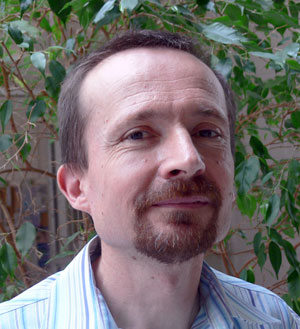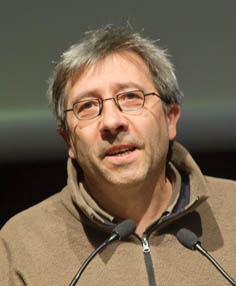Two ENS de Lyon researchers of the physics laboratory and the chemistry laboratory, have just been appointed members of the Académie des Sciences.
When the Académie des Sciences was created in 1666, its members studied astronomy, botany, mechanics or geometry. Today they are physicists, biologists, chemists or mathematicians. The ENS de Lyon is proud that five of its researchers are members of the Académie des Sciences. Patrick Flandrin, of the physics laboratory and Philippe Sautet, the Director of the chemistry laboratory have just been appointed members of the Académie des Sciences. They join the physicist, Bernard Castaing, and the biologist, Christian Dumas, appointed in 2002 and the mathematician, Etienne Ghys, appointed in 2004.
Our two new Académie members (who are not only researchers but also teachers) have in common an initial training as engineers, at Polytechnique Paris for the one and the INPG Grenoble for the other. They are both CNRS research directors at the ENS, one in chemistry the other in physics. We should also mention that Pierre Toulhoat, Director of the CRMN, has just been appointed member of the Académie des Technologies.
Portrait of Philippe Sautet
 The name Philippe Sautet is inextricably linked to chemistry and catalysis, that is, research into clean chemistry. This 49 year old engineer from the École Polytechnique (Promotion 82) holds a doctorate in theoretical chemistry (Université Paris-Sud 11) and was awarded the CNRS Silver Medal for his work on catalysis in 2007. He is a CNRS research director and currently Director of the chemistry laboratory of the École Normale Supérieure de Lyon (CNRS-ENS de Lyon) in which 90 people work. He is also Director of the Institut de Chimie de Lyon (1,000 people). His research focuses more particularly on the theory of the electronic structure at the solid/gas interface and the modelling of the elementary stages of heterogeneous catalysis. He collaborates with numerous experimental groups in this field in Europe and the United States. Philippe Sautet's scientific output is prodigious: 75 international invited lectures, 200 publications which have so far been cited over 5,000 times.
The name Philippe Sautet is inextricably linked to chemistry and catalysis, that is, research into clean chemistry. This 49 year old engineer from the École Polytechnique (Promotion 82) holds a doctorate in theoretical chemistry (Université Paris-Sud 11) and was awarded the CNRS Silver Medal for his work on catalysis in 2007. He is a CNRS research director and currently Director of the chemistry laboratory of the École Normale Supérieure de Lyon (CNRS-ENS de Lyon) in which 90 people work. He is also Director of the Institut de Chimie de Lyon (1,000 people). His research focuses more particularly on the theory of the electronic structure at the solid/gas interface and the modelling of the elementary stages of heterogeneous catalysis. He collaborates with numerous experimental groups in this field in Europe and the United States. Philippe Sautet's scientific output is prodigious: 75 international invited lectures, 200 publications which have so far been cited over 5,000 times.
Portrait of Patrick Flandrin
 Patrick Flandrin, 55, gained his engineer's diploma from the ICPI Lyon in 1978, became Docteur-Ingénieur in 1982 then Docteur d'Etat ès Sciences Physiques
Patrick Flandrin, 55, gained his engineer's diploma from the ICPI Lyon in 1978, became Docteur-Ingénieur in 1982 then Docteur d'Etat ès Sciences Physiques
(higher level doctorate in physics) in 1987, at the INPG de Grenoble. He joined the CNRS in 1982 where he is currently a research director. He has just been awarded the 2010 CNRS Silver Medal. Since 1991, he has worked at the physics laboratory of the École Normale Supérieure de Lyon, in the SISYPHE (SIgnals, SYstems and PHysics) research team. His present research themes are: non stationary signals, time-frequency, wavelets, and laws of scale and complex systems.
The common denominator of his research, which is interdisciplinary in nature, consists in the signal perspective which places Patrick Flandrin's work at the confluence of applied mathematics, physics and computing. He seeks to provide a precise mathematical framework for the methods he focuses on, to enable a simple physical interpretation of them and to associate them with efficient calculation algorithms.
CNRS/ENS/Lyon1 press release (in French)
What is the Académie des Sciences?
The Académie des Sciences is attached to the Institut de France and is one of the oldest French scientific institutions. It has its origins in Colbert's project to create a general academy in 1666. It brings together internationally influent French scientists and associates some of the most eminent foreign scholars.Its missions include the drafting of recommendations on societal issues linked to the development of the sciences, the promotion of international scientific relations and assistance in the diffusion of knowledge. It also participates in reflection on the organization of French research.






